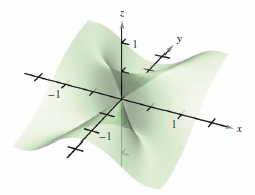Calculus III Advanced (Course) (13.2) (Homework)
Contents
Section 13.2 Homework
From Calculus 10e by Larson and Edwards, p. 887. Exercises 24, 74, 76.
Exercise 13.2.24 Limit with Two Variables
find the limit (if it exists). If the limit does not exist, explain why.
- $$ \lim_{(x,y) \rightarrow (1,-1)} \frac{x^{2}y}{1+xy^{2}} $$
Solution There is no limit because neither the denominator, nor the numerator are every zero.
Exercise 13.2.74 Limit
Consider
- $$ \lim_{(x,y) \rightarrow (0,0)} \frac{x^{2}y}{x^{4}+y^{2}} $$
in Figure 1.
(a) Determine (if possible) the limit along any line with the form \(y=ax\).
(b) Determine (if possible) the limit along the parabola \(y=x^{2}\).
(c) Does the limit exist? Explain.
Solution
(a) Substitute \(y=ax\) into the equation and solve, where \(a\) is any real number.
| $$ \lim_{(x,y) \rightarrow (0,0)} \frac{x^{2}y}{x^{4}+y^{2}} $$ | $$= \lim_{(x,y) \rightarrow (0,0)} \frac{x^{2}ax}{x^{4}+(ax)^{2}} $$ |
| $$= \lim_{(x,y) \rightarrow (0,0)} \frac{ax}{x^{2}+a^{2}} $$ |
There is a limit when \(x=a\).
(b) Substitute \(y=x^{2}\) into the equation and solve.
| $$ \lim_{(x,y) \rightarrow (0,0)} \frac{x^{2}y}{x^{4}+y^{2}} $$ | $$= \lim_{(x,y) \rightarrow (0,0)} \frac{x^{2}x^{2}}{x^{4}+x^{2}} $$ |
| $$= \lim_{(x,y) \rightarrow (0,0)} \frac{x^{2}}{x^{2}+1} $$ |
There is not limit because \(x^{2}+1 \ne 0 \) no matter what value \(x\) takes.
(c) There is no limit because different values were found when two paths were explored. For a limit to exist, it must be the same for every path explored.
Exercise 13.2.76 Finding a Limit Using Spherical Coordinates
Use spherical coordinates to find the limit. [Hint: Let \(x= \rho \sin \phi \cos \theta \) and \(y= \rho \sin \phi \sin \theta \), and \(z= \rho \cos \phi \), and note that \((x,y,z) \rightarrow (0,0,0)\) implies \( \rho \rightarrow 0^{+}\).]
- $$\lim_{ (x,y,z) \rightarrow (0,0,0) } \tan^{-1} \left[ \frac{1}{x^{2}+y^{2}+z^{2}} \right] $$
Solution Rewrite the equation in spherical terms.
- $$\lim_{ (x,y,z) \rightarrow (0,0,0) } \arctan \left[ \frac{1}{(\rho \sin \phi \cos \theta)^{2}+(\rho \sin \phi \sin \theta )^{2}+( \rho \cos \phi)^{2}} \right] $$
The integral is, for half the sphere.
- $$ \int_{0}^{1} \int_{0}^{2\pi} \int_{0}^{\pi/2} \arctan \left[ \frac{1}{(\rho \sin \phi \cos \theta)^{2}+(\rho \sin \phi \sin \theta )^{2}+( \rho \cos \phi)^{2}} \right] \: d \rho \: d \theta \: d \phi = 22.9795$$
where
- \( 0 \leqslant \rho \)
- \( 0 \leqslant \theta \leqslant 2\pi \)
- \( 0 \leqslant \phi \leqslant \pi/2 \)
Add the other half and 45.959.
Internal Links
Parent Article: Calculus III Advanced (Course)
